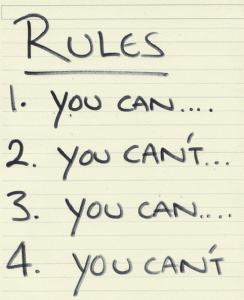Do you have a social media policy for your organization? Are you interested in discussing the topic further? #prstudchat will be talking social media policies on Twitter tonight (Jan. 19) from 8:30 p.m. - 9:30 p.m. EST.
When is honesty not the best policy? How about when it costs you your job.
Enter Glen Busch, the former director of the Chicago chapter of Coats for Kids, who was fired earlier this week for comments he made on his personal Facebook page about the deadly Arizona shootings involving Congresswoman Gabrielle Gifford.
IMO, the comments weren’t even that bad. Here’s a sampling:
- ” This was not a political thing, it was a psychotic thing. This kid was nuts! Now lets drop the ink wars and pray for the families. Maybe apologize in public just like your accusations as well? I’m just saying.”
- “Now that we know that this kid was an extreme socialist and democrat, does that change some of the opinions? Guys look, this is not political, he’s just crazy. I do not hold liberals responsible for this now that the facts are known.”
Apparently, Busch’s boss disagreed. He issued a statement to Busch stressing how important it was for nonprofits to avoid controversy. And that it was impossible for Busch not to be associated with his employer — in this case, Coats for Kids. Busch’s response: “We don’t even have a policy.”
There is a lesson to be learned on both sides here, but let’s start from the organization’s side:
Lesson 1: You MUST have a social media policy these days
There is no clear line when it comes to social media. What one person thinks is acceptable to share, another employee finds fault in. Just like kids, people need rules. And in this case, we also need education. If you want to influence how your employees talk about your company or outside issues regarding social media, create some guidelines and communicate the policy. If you don’t, your organization will without a doubt encounter a Glen Busch or placenta picture situation sooner or later.
Also, understand that as a country, we are still trying to figure out these issues from a legal perspective. So there isn’t really much of a precedent. In fact, one of the most recent rulings on this topic was in favor of the aforementioned nursing student — Doyle Byrnes — who posed for a picture with a placenta and posted it on Facebook. The student was dismissed from the nursing program by the college for posting the picture, but was recently reinstated. The judge’s rationale according to The Kansas City Star:
- Photos are taken to be viewed, and if the students were given permission to photograph the placenta, it became irrelevant what they did with the pictures.
- There was no violation of any patient’s privacy because there was nothing in the photos to identify whose placenta it was.
- Byrnes was not allowed a fair hearing on her dismissal.
You’ve probably seen this resource of social media policies. And it’s a good place to start. But just creating a policy isn’t enough. No one is going to get up early and rush to school or work to study the social media policy. And there won’t be any policy parties. Education and real-life examples are key to understanding the issues. Imagine if Glen had gone through a training course that stressed how important it was for Coats For Kids employees not to discuss politics online. Also, make sure to explain how employees/students can use social media to benefit your organization. Because they are going to use social media.
Lesson 2: You ALWAYS represent organizations with which you are affiliated, online or offline
Not sure that Glen’s comments are the best example here because I still don’t see how they are that inflammatory. But the argument that they were posted on his personal Facebook page — which I think WGN made, not Glen — is not a good one. And the same can be said for Doyle posting the placenta picture. If you post it online anywhere, it can always be traced back to you and can always be seen by anyone, including your employer. It does not mater what privacy settings you have. People cut and paste into e-mails all the time.
There is no such thing as a separate personal and professional life online. It doesn’t exist. One of the most common comparisons I hear is that you shouldn’t post anything on social media that you don’t want to appear in the newspaper the next day. Everyone shakes their heads at the person who posted something suspect and then nods their heads at the newspaper analogy. But at the end of the day, these placenta and political situations keep popping up everywhere. It’s like people don’t think it will happen to them and when it does, it’s too late. You can’t erase the Internet. Just ask Al Gore.
The advice here is simple, but needs to be stated. If you aren’t sure if it’s ok to post something, ask. Doyle actually did just that and it was one of the reasons she was reinstated into the nursing program. Don’t be naive. Anything you’ve shared via social media could be shared with your boss or teachers at some point. So no matter if your job/school has a social media policy, set your own rules for yourself and don’t end up in the news as an example.
I think Glen got screwed. But I think Doyle got lucky. At a past job, we had an employee who was trying to help a customer and posted proprietary information to answer a question. There was a social media policy and that person was fired. But am I sure we did the best job on employee education. No, I really can’t say that.
The bottom line is that for organizations, a social media policy is not optional anymore. Because social media is not optional. And a lack of a policy at this point is irresponsible. Almost as irresponsible as you putting your job on the line to post some picture your friends might “like.”










[...] Check out Justin’s post on Social Media Policy: Having a Social Media Policy is No Longer an Option [...]
[...] need a social media policy at your company. Justin Goldsborough has a nice post about why “Having a social media policy is no longer optional.” He also provides a link to lots of sample policies. If you have money to spend, I like the [...]
[...] siteHaving a social media policy is no longer optional [...]